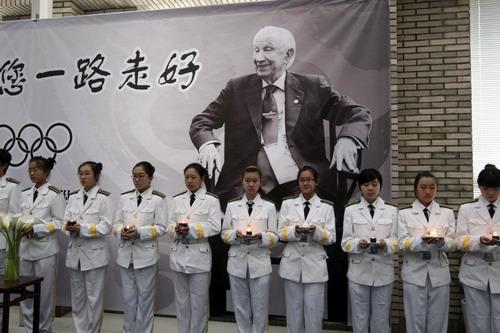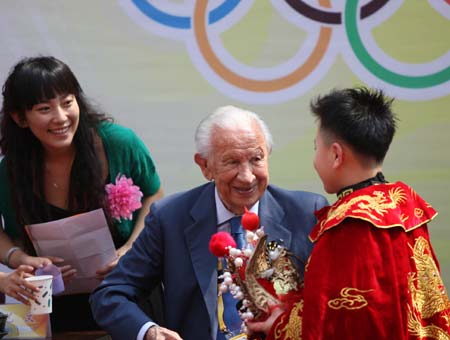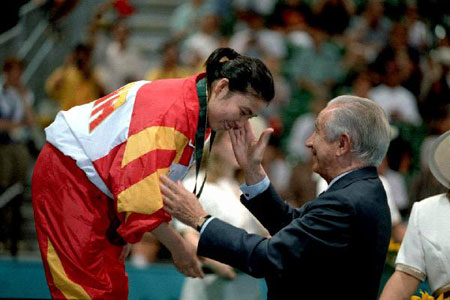24 de Abril 2010
Samaranch. El Amigo Samalanji
El sábado pasado iba en un taxi y mientras estaba respondiendo al taxista el clásico interrogatorio, me sorprendió un comentario del conductor: "ah, sí, España. Samalanchi. Samalnchi es muy amigo de China". (萨sa马ma兰lan奇ji)Así es como llaman los chinos a Juan Antonio Samaranch, fallecido hace unos días y que no me voy a extender en narrar quién fue, ni su vida y logros, pues de eso ya se han encargado de sobra multitud de medios de comunicación y no quiero repetirme.

Probablemente el taxista me vino con ese comentario porque en los medios de comunicación chinos, se estaba ya hablando del delicado estado de salud del mítico Presidente del COI. Mientras que la prensa española en Internet no se hacía todavía eco, millones de chinos sí estaban al tanto de la hospitalización de Samaranch. Ha fallecido a los 89 años, que ya firmaba yo. En su etapa al frente del COI, dejó un hermoso recuerdo. No es fácil ser Presidente de una organización que hoy en día engloba la totalidad de los países del mundo, cada uno con sus distintas costumbres, ideologías, sistemas políticos o religiones.
Estos días han surgido posts (pocos, eso sí) en ciertos blogs y medios de comunicación, afirmaciones en contra de Samaranch acusándolo de ser "amigo de Franco". Es cierto que Samaranch fue procurador de las Cortes y Presidente de la Diputación de Barcelona en tiempos de Franco, pero fue la misma persona que años después restableció las relaciones diplomáticas con la URSS cuando fue nombrado Embajador en Moscú, uno de los máximos defensores en que Barcelona fuera sede olímpica en 1992, y el que tras más de 10 años de contactos con los chinos y animando la candidatura de Pekin, por fin un día anunció la capital China como sede olímpica. Los que escriben hoy mal sobre Samaranch, demuestran ser analfabetos históricos, apestando a naftalina aunque quizá no habían ni nacido cuando Franco murió y que de tanto nombrarlo, lo único que consiguen es mantener su memoria siempre fresca. Gente imbécil que no saben que como mejor se reforma un sistema y de una manera más profunda y duradera, es DESDE DENTRO y no luchando abiertamente en contra.
Samaranch fue nombrado por el gobierno "Amigo Especial de China", un honor otorgado a sólo unos pocos privilegiados extranjeros. Algo que los chinos nunca olvidaron y que siempre mantendrán en su recuerdo.
Hace tiempo mi amiguete Ricardo me habló de un texto escrito por Samaranch tras el éxito de los JJOO del 2008 titulado "Por qué amo y respeto a China tanto". La última parte del texto es para mí la más entrañable. Está en inglés, pero se entiende fácilmente y recomiendo su lectura, para entender mejor lo que es la constacia, la capacidad de trabajo, desde dentro un mismo sistema para conseguir el éxito y el cambio.

"WHY I LOVE AND RESPECT CHINA AS MUCH AS I DO"
By Juan Antonio Samaranch (China Daily)
2008-09-09
The sporting and organizational success of the recent Olympic Games in Beijing, unanimously recognized by international public opinion, inspires me to share with readers the origins of and reasons for my long friendship with the Chinese people.
In the full swing of democratic transition, King Juan Carlos I appointed me as Spain's ambassador to the Soviet Union and Mongolia in 1977, the first Spanish representative in Moscow since the reestablishment of diplomatic relations with the then USSR. I cannot conceal that this assignment enabled me to consciously prepare for my election to the Presidency of the International Olympic Committee (IOC) once Lord Killanin, the then president, had announced that he did not intend to stand for re-election.
My experience in Moscow was exciting: the city and its authorities were immersed in the process of organizing the Games of Olympiad, held in July 1980, and the Soviet capital was constantly hosting IOC members following the organizational work.
These contacts with my IOC colleagues allowed me to share with them my future Olympic ambitions, thus earning me their trust with a view to the ballot box.
Also during this period, very discreetly, contacts were initiated with then mayor of Barcelona, Narcls Serra, raising the idea that if I was elected as IOC president, Barcelona could present its candidature to host the Games.
All went according to plan. After I was elected at the 83rd IOC Session, I resumed my conversations with Serra with a view to taking up the challenge that had been pending for many generations: Barcelona, Olympic City!
During my assignment in the Spanish embassy in Moscow, I was able to count on the collaboration of the embassy's first secretary, Eugeni Bregolat, who was then a young diplomat who would go on to have a brilliant career, becoming Spanish ambassador to China on two occasions, a unique feat in the diplomatic world. During this period as a representative of Spain, he maintained good relations with other colleagues from friendly countries. I remember especially the ambassador of the Federal Republic of Germany, who, years later, during his assignment as a high-ranking FRG information service official, gave me a lot of help with the drawn-out difficulties faced with the Seoul Games in 1988.
Contacts between diplomats were regular, and I went fairly frequently to the embassy of the People's Republic of China, in the Lenin Hills. We held meetings in a conveniently padded room to avoid the possibility of the conversations being recorded.
During these years, although the USSR and China professed a communist ideology, they were very far apart and their different politics were obvious.
In these circumstances, we started to deal with the inclusion of China in our organization. We owe the first steps to my predecessor, President Killanin, although concrete discussions started in 1979.
This historic opportunity could not be missed, and four months after I became president, we reached an unprecedented compromise, mainly thanks to the generosity of the leaders of the People's Republic of China. At the time Deng Xiaoping, the real architect of New China, initiated its opening up to the West and implemented the first economic reforms.
Thanks to the practical sense displayed by the Chinese, the Chinese Olympic Committee was recognized and we kept the Olympic Committee of Chinese Taipei in our organization.
I had the chance to thank Deng Xiaoping, small in stature but a giant in historical vision, for his great generosity on the occasion of an invitation sent to me in 1984 to be present on the stand of honor at the entrance to the Forbidden City. This stand of honor is used for the great military parades on Tian'anmen Square. I was greatly surprised to realize that the only Western guests on this stand of honor were my wife and myself, as the written accounts confirm.
My support for Olympic recognition of Chinese sport would suggest that the People's Republic of China now regarded me as a loyal friend. And subsequently the opportunity to demonstrate this arose.
In 1984, the USSR called for a boycott of the Olympic Games in Los Angeles. Even though the USSR Sports Minister Marat Gramov assured me that they were not in favor of a boycott, the threat was there. Conversations with George Shultz, Secretary of State under the Reagan administration, and then USSR Minister of Foreign Affairs Andrei Gromyko inevitably led to a boycott, despite my negotiation efforts.
The internal situation in the USSR, the sudden death of Yuri Andropov and Chernenko's rise to power did not allow for optimism. The USSR encouraged a boycott by the countries within its sphere of influence, although China, Yugoslavia and Romania defied the pressure and were in the Olympiad city. I remember the moment when the Chinese team entered the Los Angeles Coliseum to be met by deafening cheers. The Californian public responded in the same way to China's first Olympic gold medal, which I personally presented to pistol shooter Xu Haifeng, who had beaten the Swedish shooter who had won gold in Munich.
For its first participation, China won a total of 32 medals, and by defying the boycott, earned the respect and admiration of the West.
After this sporting success, the Chinese began to give serious consideration to the possibility of hosting the Games in the near future. IOC member He Zhenliang, whom I regarded as my Chinese brother, had been elected as an IOC vice-president, and efforts began to encourage a future bid by Beijing. The bid leaders acted skillfully, and brilliantly defended their project.
During the Games in Barcelona, I received the mayor of Beijing and a large delegation, who shared with me their enthusiasm and hope of being selected. At the 101st Session, in Monte Carlo in 1993, the IOC members had to choose between five cities: Beijing, Berlin, Istanbul, Manchester and Sydney. The Australian city won by just two votes, and with a number of incidents it is better not to recall. The Chinese complied with the decision, accepting defeat but determined not to forget.
I let a prudent length of time elapse before making my suggestion: Beijing should not throw in the towel and give up the idea of hosting the Games in the future.
I said as much to Jiang Zemin, the Chinese leader who succeeded Deng Xiaoping. The then President of the People's Republic of China stood firm: he paid no heed to my recommendations, and decided to miss his turn. Beijing was not a candidate for the 2004 Games, which were finally awarded to Athens.
But I kept insisting, because I had one fixed idea: the Olympic Movement had to agree to entrust to the great nation of China, with its more than 1.3 billion inhabitants, the great Olympic project of the 21st century. This would make us stronger.
During that time, the world watched the vertiginous growth of China and how the most populous nation on earth was in the process of becoming a great power. It was then President Jiang Zemin himself, the former mayor of Shanghai, who told me of his intention: the decision had been taken that the Chinese capital, Beijing, would seek to host the Games in 2008.
At the Session in Moscow in July 2001, I stood down as president and was there when the IOC took two historic decisions: to elect my successor as IOC President, the Belgian surgeon Jacques Rogge, who is proving to be a great President; and to choose Beijing to stage the 2008 Games, beating the four other candidate cities in the second round of voting (Paris, Osaka, Toronto and Istanbul) with a large majority.
From the first day, it was clear that the road to 2008 would not be pleasant for the Chinese authorities. The "lobbies" began a wearing campaign that would last for seven years of preparatory work, and would not end until the Olympic flame was extinguished in the Bird's Nest.
The crisis in Darfur and the involvement of China (the People's Republic is the country that sends the most aid to Africa and makes the most investments to develop the continent); the resignation of Steven Spielberg as an advisor for the Olympic ceremonies; the incidents in London and Paris during the Olympic Torch Relay; the calls by some politicians to boycott the ceremonies; the worldwide alarmism created by the alleged pollution problems that were going to hinder normality in some athletic events; the traffic congestion problems that would impede the movement of athletes; the "lack of freedom" of expression and Internet access; and the reporting that in Beijing no records would be set (43 world and 132 Olympic records were broken). Fortunately, none of these threats came to pass, and the success hushed even the most vocal alarmists.
The Games were a great opportunity and a pretext for China to raise the world's awareness of its thousand-year-old culture and for the Chinese people to co-exist and mix openly and freely with their guests, enjoying what in the Olympic Charter is known as the "Olympic spirit". The Games were a great success for the people, thanks to the commitment and support of the government, which spared no economic resources.
The Beijing Games won the admiration of the world, thanks to the friendliness and warmth of the half-a-million volunteers, who were eager to welcome visitors. The Games were a resounding success - something that is going to prove very difficult to equal in the future. I had the opportunity to tell this to President Hu Jintao in the course of the private audience he granted me.
The cost of these Games will remain a mystery. But this is of little importance when one sees the sports facilities such as the Bird's Nest and the Water Cube - real architectural wonders. We are not talking of money wasted, rather money well invested to consolidate the future of a great nation. Nobody questions whether China is now an incontestable reality.
Economic growth has changed the social structure of the population, with the appearance of new social classes and an improvement in the quality of life of millions of people. Everything in China takes on a gigantic dimension, and sometimes this is difficult to understand for Westerners. A simple example is borne out by this question: can a Westerner understand that the Nanshan golf course, in the city of Yantai, Shandong province, has a surface area of 1.3 million sqm, with a course of 225 holes? Or put another way: 12 courses with 18 holes and 1 in 9.
The Chinese are people who have long memories and know how to demonstrate their deep feeling of loyalty to people who, in difficult times, have stayed at their side. It is because of this at these Games, the last ones awarded during my presidency, that I have been able to enjoy countless signs of friendship and affection, for which it is very difficult to express thanks using words.
Over the last 30 years, I have had the opportunity to travel to China 29 times, and the next time will be on 7 September to attend the Opening Ceremony of the Paralympic Games, officially representing the President of the International Olympic Committee. Over the years, I have received from China displays of affection and friendship, and I have come to love and respect the Chinese people.
The author is Honorary President of the International Olympic Committee

Siempre ha estado al servicio de los que mandan.
http://www.javierortiz.net/jor/jamaica/samaranch
Antes, y después. Ha sido coherente hasta el final.
El COI, los Juegos Olímpicos son un negocio, y como tal lo ha gestionado mientras estuvo al mando.
Saludos,
Escrito por corsaria a las 27 de Abril 2010 a las 12:34 PMSinceramente; no conocía mucho la trayectoría de Samaranch. Lo se, soy una vergüenza.
La verdad es que la gente le tenía un gran cariño, mucha estima y era muy conocido allá donde iba por sus buenas maneras y su saber estar. Por lo visto, tu trayectoria profesional ha sido de gran valor para mucha gente y ha creado relaciones estrechas que han desembocado en un gran cariño, tanto por parte de países como de ciudadanos.
Gente como era el, queda muy poquita.
Un gran hombre ;)
Cada uno a lo suyo... esto es un mundo de pesaos...
http://www.eljueves.es/2010/04/24/garzon_empenado_levantar_los_cadaveres_del_franquismo_exhuma_tumba_samaranch.html